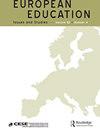《像教授一样看问题》或《换挡:后苏联时期俄罗斯大学的时代性和转型步伐》
IF 0.9
Q4 EDUCATION & EDUCATIONAL RESEARCH
引用次数: 2
摘要
在过去的近30年里,俄罗斯大学受到了外部力量的冲击,需要努力适应全球和地区快速变化的学术环境。本文基于2012年至2018年间对俄罗斯不同年龄段和级别、学术领域和地区的大学教师进行的非正式结构化访谈,探讨了俄罗斯大学生活中发生的事情;教授们是如何评价变化的,大学生活的节奏是如何改变的——这些问题是通过揭示学术自由和时间性概念之间的联系来解决的——时间性是指在大学里随着时间的推移施加控制的感知能力。本文章由计算机程序翻译,如有差异,请以英文原文为准。
“Seeing like a Professor” or Shifting Gears: University Temporality and the Pace of Transformation in Post-Soviet Russia
Abstract Over the past nearly 30 years, Russian universities have been buffeted by external forces necessitating attempts to adjust to a fast-changing academic climate, both globally and regionally. Based on informally structured interviews of university faculty of different age groups and ranks, academic fields and regions of the country conducted between 2012 and 2018, this essay examines what transpires in the life of a Russian university; how do professors evaluate change and how has the pace of university life been altered—such questions are addressed by revealing the connection between notions of academic freedom and temporality—the perceived ability to exert control over time at the university.
求助全文
通过发布文献求助,成功后即可免费获取论文全文。
去求助
来源期刊

European Education
EDUCATION & EDUCATIONAL RESEARCH-
CiteScore
1.20
自引率
0.00%
发文量
5
期刊介绍:
uropean Education is published in association with the Comparative Education Society in Europe (CESE). It is an international peer-reviewed journal devoted to original inquiries and dialogue on education across the member states of the Council of Europe. Established in 1969, the journal features articles on education in individual member states, comparative studies on education across Europe, as well as the impact of European education initiatives globally. The journal especially encourages theoretical and empirical studies, interdisciplinary perspectives, and critical examination of the impact of political, economic, and social forces on education. European Education includes reviews of books and educational films, including those published/produced in English and other languages.
 求助内容:
求助内容: 应助结果提醒方式:
应助结果提醒方式:


